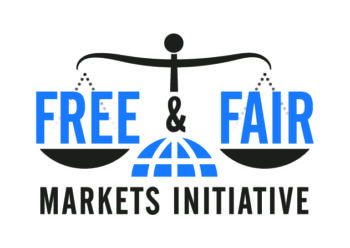
Date: March 7, 2019
Contact: mediacenter@freeandfairmarketsinitiative.org
In Case You Missed It!
Amazon’s Grocery Expansion Raises
Antitrust Risks For Bezos
James Langford
Washington Examiner
March 6, 2019
Amazon’s plan to expand in the $830 billion grocery industry is rattling potential competitors, but also runs the risk of further aggravating congressional concerns that the e-commerce giant is behaving like a monopoly.
The company founded by Jeff Bezos, the world’s richest man, and others like Facebook and Google are already under scrutiny by President Trump and lawmakers because of their market power, as well as their control of platforms that give them a powerful advantage over business customers who are also competitors.
Amazon’s latest move “is yet another example of the tech giant knocking on the doors of local businesses and giving them an ultimatum: leave or lose,” said Robert Engel, a spokesman for the Free & Fair Markets Initiative. “This kind of by-any-means acquisition strategy is a disaster for grocery store owners, their employees, and consumers.”
The Seattle-based company’s plan, which calls for opening dozens of grocery stores in major U.S. cities starting with Los Angeles, was detailed in a March 1 article in the Wall Street Journal, the same week that the Federal Trade Commission announced a task force of 17 attorneys to police competition in tech markets. It was only days before a Senate antitrust subcommittee hearing in which participants name-checked the company repeatedly.
Since most FTC antitrust activity occurs behind the scenes, the agency’s public announcement is a clear indication of its direction, said Paul Gallant, an analyst with Cowen Washington Research Group, which has tracked federal policy for the past four decades. The industries that officials cited, from platform businesses to social media, make clear that “Google, Amazon, Facebook and Apple are all potential targets,” he said.
Amazon alone has a market value of $833 billion and briefly topped $1 trillion last year. It increased sales nearly tenfold to $232.9 billion over the past nine years, shaking up a retail landscape once dominated by brick-and-mortar firms like Macy’s, J.C. Penney, and Toys R Us.
The company’s grocery store initiative would expand its already-mammoth footprint beyond the high-end food market it targeted with the 2017 purchase of Whole Foods for $13.7 billion.
It would also provide important data on U.S. households and shopping frequency that Amazon could use to hone machine-learning algorithms that enable it to better target customers, said Brian Nowak, an analyst at New York investment bank Morgan Stanley.
“Amazon flexing its muscles in the broader grocery space poses a threat to traditional food retailers,” he added, noting that Whole Foods alone was never likely to give the company a dominant position, since it had only 500 stores and catered to a niche market.
“It now seems the Whole Foods acquisition was a shot across the bow, which enabled Amazon to learn the ins and outs of physical grocery retail,” Nowak said.
The company attempts to “dominate every market it touches,” Camilla Yanushevsky, an analyst for CFRA Research, wrote in a report titled “Death by Amazon: A Look at the Victims and Survivors.” Amazon has threatened the market share of stalwarts in retail sectors from home furnishings to office supply and jewelry, while finding pockets of resistance in apparel and cosmetics, she said.
Both Republicans and Democrats have noticed, and have both signaled a desire to pump the brakes on Amazon.
President Trump, a frequent critic of both the company and Bezos, observed as long ago as April that Amazon was putting “many thousands of retailers out of business.”
Sen. Elizabeth Warren, a Massachusetts Democrat seeking the party’s nomination for president in 2020, said in September that the government should force the company to decide whether it wants to be a merchant selling products or a tech firm offering a platform to retailers.
“Pundits often lament the curse of bigness, arguing that concentrated corporate power is hurting small businesses, increasing inequality and ultimately doing things that may tend to undermine the republic,” Sen. Mike Lee, R-Utah, said during the antitrust subcommittee hearing, which was held Tuesday.
“It’s no longer an exaggeration to say that in the last 15 years, Facebook, Google, Twitter, and Amazon have fundamentally transformed life for many Americans,” he added. “People look at the conduct of these companies and start to worry.”
To access the full article, click here.
###
ABOUT THE FREE & FAIR MARKETS INITIATIVE
The Free & Fair Markets Initiative (FFMI) is a non-profit coalition of businesses, consumer advocacy groups, workers and community activists committed to scrutinizing and highlighting emerging market trends that are stifling competition and innovation, influencing federal and local government spending, putting consumer data in harm’s way and limiting consumer choice. For a list of members, please visit https://freeandfairmarketsinitiative.org/about-us/members/. For more information on the Free & Fair Markets Initiative, please visit https://freeandfairmarketsinitiative.org.